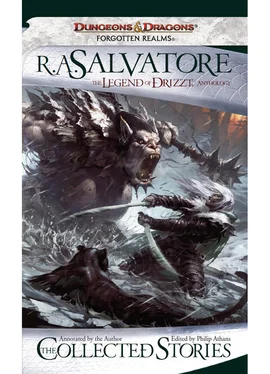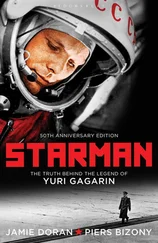R. Salvatore - The Collected Stories, The Legend of Drizzt
Здесь есть возможность читать онлайн «R. Salvatore - The Collected Stories, The Legend of Drizzt» весь текст электронной книги совершенно бесплатно (целиком полную версию без сокращений). В некоторых случаях можно слушать аудио, скачать через торрент в формате fb2 и присутствует краткое содержание. Жанр: Фэнтези, на английском языке. Описание произведения, (предисловие) а так же отзывы посетителей доступны на портале библиотеки ЛибКат.
- Название:The Collected Stories, The Legend of Drizzt
- Автор:
- Жанр:
- Год:неизвестен
- ISBN:нет данных
- Рейтинг книги:4 / 5. Голосов: 1
-
Избранное:Добавить в избранное
- Отзывы:
-
Ваша оценка:
- 80
- 1
- 2
- 3
- 4
- 5
The Collected Stories, The Legend of Drizzt: краткое содержание, описание и аннотация
Предлагаем к чтению аннотацию, описание, краткое содержание или предисловие (зависит от того, что написал сам автор книги «The Collected Stories, The Legend of Drizzt»). Если вы не нашли необходимую информацию о книге — напишите в комментариях, мы постараемся отыскать её.
The Collected Stories, The Legend of Drizzt — читать онлайн бесплатно полную книгу (весь текст) целиком
Ниже представлен текст книги, разбитый по страницам. Система сохранения места последней прочитанной страницы, позволяет с удобством читать онлайн бесплатно книгу «The Collected Stories, The Legend of Drizzt», без необходимости каждый раз заново искать на чём Вы остановились. Поставьте закладку, и сможете в любой момент перейти на страницу, на которой закончили чтение.
Интервал:
Закладка:
The dragon looked back to the pond and considered the tunnels beneath the dark waters that would take him home. He looked back to the south and flexed his wings yet again.
Still clutching the sack, Urshula leaped into the air. Great wings rolled parallel to the ground, bent slightly, and caught the air beneath them, driving the wyrm higher. From fifty feet up he saw the city and was surprised at the size of it. Thousands of people lived there, or so it seemed, for its walls ran wide and far to the south. Scores of structures dotted the interior, some of them extensive and multi-storied.
A wave of hatred rankled the beast, and Urshula almost gave in to it and dived headlong for that intrusion. How dare they build such a place upon his land!
But then he heard the horns blowing and saw the black specks-the guards of the distant city-scrambling along the walls.
Urshula had gone against a city-not a town, but an organized and defended city-only once before. One wing, his rear right leg, and his lower torso still ached with the memory of stinging pain.
Still, these intruders could not go unpunished.
Urshula climbed higher into the darkening sky. He let forth a roar, for he wanted terror to precede his attack.
He leveled off once he passed above the clouds, and he could imagine the poor fools along the city’s wall scanning the skies in desperation.
He drifted south for a short while, then he dived, a power swoop that shot him out from the cloud cover at full speed, the wind shrieking over his extended wings. He heard the screams. He saw the scrambling. He smelled the tiny arrows reaching up to him.
He crossed over and strafed with his acidic breath, drawing a line of devastation down the center of the city. A few of the arrows nipped at him. One spear lifted up high enough for Urshula to bite it out of the sky.
And he was gone, out over the city’s southern wall. A slight tilt of his wings angled the dragon to climb into the air once again.
The dragon knew they’d be better prepared for his second run, but there would be no second run. Urshula rose up even higher. He banked back to the north and flew over the city from on high, well out of reach of the puny arrows.
He glided down, swooping past the remains of the dwarf camp, then dipped and plowed into the lake, lifting a wall of water high into the air.
Wings tucked back as he descended, the dragon’s great body swayed to push him through the cold current of the underground river that brought water from the spring melt at the Great Glacier. Urshula would never run out of breath, though, for black dragons were perfectly adapted to such an environment. Some minutes later, the dragon turned into a side passage, a lava tube from an ancient volcano that gradually climbed so that, after a long while, he came free of the water.
He followed his subterranean network of trails unerringly, traversing corridors so wide that he could occasionally flex his wings, and so narrow that his scales scraped the worms and roots as he snaked his way through. In one of those narrow corridors, Urshula paused and sniffed. He nodded, knowing that he was parallel to his lair.
He turned his head into the soft ground and brought forth his acidic breath but sprayed it gradually, melting and loosening the dirt before him as he bored through.
He broke into the southern rim of the side room of his lair, crawled forth, and shook the peat and dirt from his interlocking scales. He stopped and snapped his long, thick tail against the wall of dirt, collapsing the tunnel behind him, and issued a growl that sounded almost like a cat’s purr. His lamplight gaze fell over his bed of coins and gems, suits of armor and weapons. He flung his newest sack of treasure atop the pile and slithered forth.
He collapsed in pleasant thoughts of devastation and considered again the taste of dwarf, raw and cooked. His tongue snaked between his great fangs, seeking morsels and sweet memories.
Then the dragon’s lamplight eyes closed, the lair fell into pitch blackness, and Kazmil-urshula-kelloakizilian, the Beast of the Bog, slept.
“Minor damage from a meager wyrm,” said Byphast the Frozen Death. She appeared in all ways an elf, except that her hair shone silver rather than the usual golden or black, and her skin was a bit too white. Her eyes, too, did not fit the overall image, for they showed a cool shade of yellow, with a line of black centering them, like the eyes of a hunting serpent. “Palishchuk shows the scars you predicted, several years old, but they are of little consequence.”
In the room was one other, seated at a small table before a trio of large bookcases, who slowly swiveled his head Byphast’s way. The fabric of his gray cloak was torn in strips to reveal the velvety blackness of the robe beneath. His voluminous sleeves hung below the edge of the table, but when the man turned, his fingers showed.
Fingers of bone. A living skeleton.
Beneath the great hood of the robe, there was only blackness, and Byphast was glad for that.
Her relief did not hold, though, as Zhengyi lifted one of his skeletal hands and drew the hood back. The gray and white skull came into view. The pieces of rotting flesh and the inhuman, unearthly eyes-points of red and yellow fire-forced Byphast to glance away. And the smell, the essence of death itself, nearly backed her out of the room.
Zhengyi pulled the hood back all the way to reveal the splotches of his white hair, clumped at all angles across his bony pate. If most people coifed themselves to appear more attractive, it seemed quite apparent that Zhengyi did the opposite.
For as most people, as most creatures, reveled in life, so did Zhengyi revel in death. He had passed beyond his human form into a state of undeath. Of the many variants among the walking dead on Toril, none was more abhorrent and revolting than a lich. A vampire might charm, might even be beautiful, but a lich was not a creature of subtlety. A lich didn’t enter a bargain with Death, as did a vampire. A lich wasn’t an unwilling participant in the state of undeath, as were the minor skeletons, zombies, and ghouls. A lich was a purposeful creature, a wizard who by powerful enchantments and sheer force of will had defeated Death itself, had refused to surrender consciousness and self-awareness or to give in to some otherworldly, godly being.
Even Byphast the Frozen Death, the greatest white dragon of the Great Glacier, shifted uncomfortably from foot to foot in the presence of Zhengyi. She wished the corridors of Castle Perilous were wider and higher so that she might face Zhengyi in her awe-inspiring dragon form.
Realistically, though, Byphast didn’t believe the lich would be impressed by even that. Certainly Zhengyi had shown no fear when he’d traversed the icy corridors of Byphast’s lair to confront her in her very treasure room. He had passed through the remorhaz pit, where several of the mighty polar worms, minions of the white dragon, stood guard. He had so dominated the ice trolls Byphast used as sentries that they hadn’t even warned their dragon deity of Zhengyi’s approach.
“Tell me, Byphast, what lingering damage might your own deadly breath have caused to the stone of Palishchuk?” the lich replied at last.
Byphast’s reptilian eyes narrowed. Her breath was frost, of course, powerful enough to freeze solid the flesh and blood of living enemies but largely ineffective against stone.
Or against a lich.
“A black dragon’s spittle is concentrated,” Byphast replied, her teeth gritted. She felt the twinges of anger ripple through her elf form, screaming at her to revert to her natural state. “Blacks can wreak devastation indeed, but in a smaller area. The breath of a white dragon fans wider and is deadly even at the fringes. And more effective. I can kill all within without destroying the city itself. The people die, the buildings remain. Which is the wiser choice, Witch-King?”
Читать дальшеИнтервал:
Закладка:
Похожие книги на «The Collected Stories, The Legend of Drizzt»
Представляем Вашему вниманию похожие книги на «The Collected Stories, The Legend of Drizzt» списком для выбора. Мы отобрали схожую по названию и смыслу литературу в надежде предоставить читателям больше вариантов отыскать новые, интересные, ещё непрочитанные произведения.
Обсуждение, отзывы о книге «The Collected Stories, The Legend of Drizzt» и просто собственные мнения читателей. Оставьте ваши комментарии, напишите, что Вы думаете о произведении, его смысле или главных героях. Укажите что конкретно понравилось, а что нет, и почему Вы так считаете.












